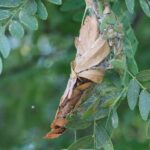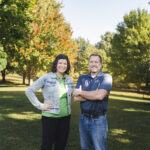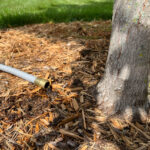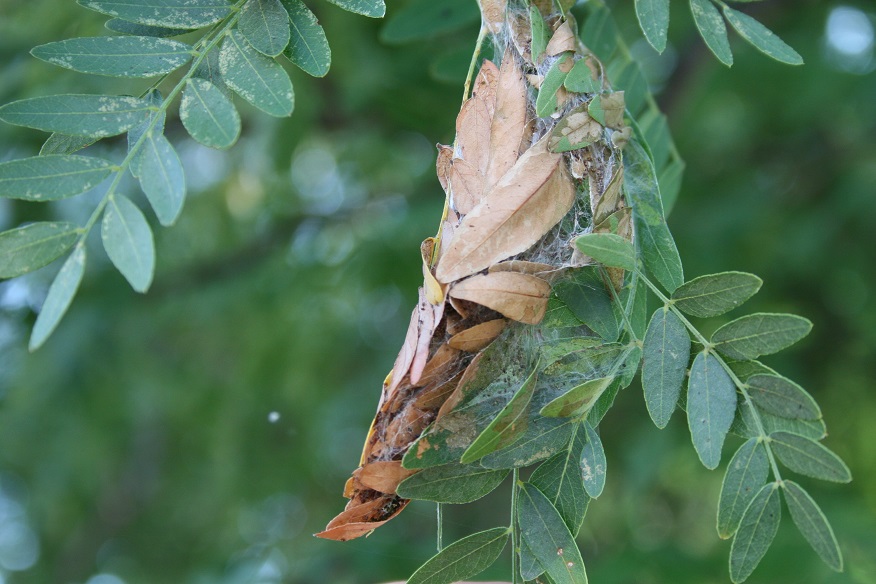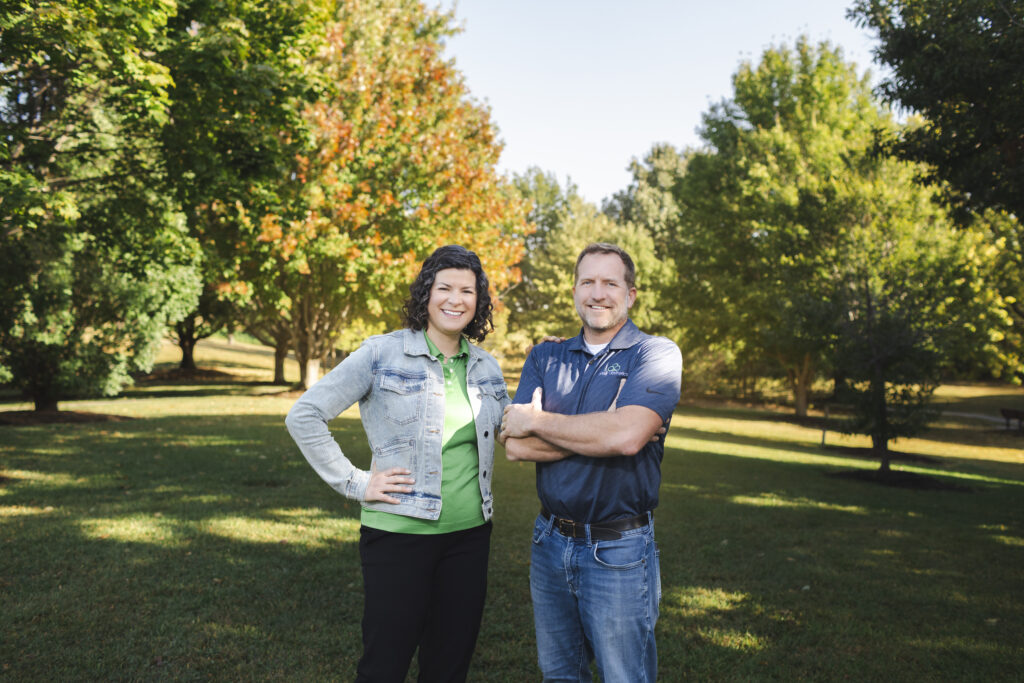Background
Japanese beetles are a fairly new pest to Omaha, but they’re been in the U.S. since as early as the 1920s. This iridescent copper and green beetle feeds on over 200 species of plants and trees, though are most commonly found in Nebraska on lindens, birches, elms, fruiting trees, roses, and buckthorns. Rarely will the feeding kill a tree (unless it’s young or already stressed), however it’s a major aesthetic issue, and repeated years of heavy feeding does reduce the plants’ energy reserves, setting it up for decline down the road.

Life Cycle
The beetles spend most of their lives as grubs in the soil. Adult beetles emerge in late June to early July, and begin feeding at the tops of trees. These early feeding beetles emit pheromones as they munch on the leaves, causing others to congregate. As they feed, they move down the tree, causing the leaves to be ‘skeletonized’, leaving just the veins behind. These lacy leaves then commonly drop from the tree, making it look like fall has arrived in the middle of summer.

When not preoccupied with feeding, the beetles find time to mate and lay eggs (what a life!). Eggs are laid near the soil surface, and the newly hatched larvae tunnel in late summer to overwinter in the soil until the next season. While the adults feed solely on trees and shrubs, the larvae feed on grass roots and can cause problems for the turf. Brown patches in the yard that easily pull up are a sign of grub issues. On top of that, it’s not uncommon for animals such as skunks, opossums, and raccoons to dig in the yard for a tasty treat.
Control
On a positive note, Japanese beetles can be controlled to minimize damage. If you’ve had issues with grubs killing the lawn, you or your lawn company should put down a granular insecticide early in the spring to help kill grubs. Most professional lawn services have this built into their maintenance program. This can help your lawn but won’t do much for your trees, as the beetles will still fly in from neighboring sites.
Treatment for trees is best done preventatively using systemic insecticides placed in the soil that travel up through the roots and into the leaf tissue, thus killing the beetles as they feed. It’s important to note that none of these treatments act as repellants. The beetles must feed on the leaves in order to die. The timing and chemical required depend on the type of tree or plant. Birches, elms, buckthorns, and other non-flowering trees and shrubs can be treated with imidacloprid in the spring once a year, at least a month prior to beetle emergence. This product is not registered for flowering trees, however, as it has been associated with the decline in pollinator populations. For lindens and fruit trees, acephate can be injected in the soil at the time of beetle emergence, which can provide 4-6 weeks of control. For last minute applications when systemic insecticides will be too slow to be effective, foliar sprays will be effective. Sprays with bifenthrin or permethrin will provide two weeks of control, and will need to be repeated until mid-to-late August when the beetles stop feeding. (Yes, Arbor Aesthetics offers all of these treatment options!)
Treatment for trees is best done preventatively using systemic insecticides placed in the soil that travel up through the roots and into the leaf tissue, thus killing the beetles as they feed. It’s important to note that none of these treatments act as repellants. The beetles must feed on the leaves in order to die. The timing and chemical required depend on the type of tree or plant. Birches, elms, buckthorns, and other non-flowering trees and shrubs can be treated with imidacloprid in the spring once a year, at least a month prior to beetle emergence. This product is not registered for flowering trees, however, as it has been associated with the decline in pollinator populations. For lindens and fruit trees, acephate can be injected in the soil at the time of beetle emergence, which can provide 4-6 weeks of control. For last minute applications when systemic insecticides will be too slow to be effective, foliar sprays will be effective. Sprays with bifenthrin or permethrin will provide two weeks of control, and will need to be repeated until mid-to-late August when the beetles stop feeding. (Yes, Arbor Aesthetics offers all of these treatment options!)
Traps: Are they effective?
A common question is whether or not to use pheromone traps in the yard. The short answer is NO. Don’t do it. Studies have shown the traps bring in more beetles than they catch, and will draw in beetles in from an even larger area.
Dylan Willis, Plant Healthcare Specialist
B.S. Forest Science
ISA Certified Arborist
Dylan Willis, Plant Healthcare Specialist
B.S. Forest Science
ISA Certified Arborist
